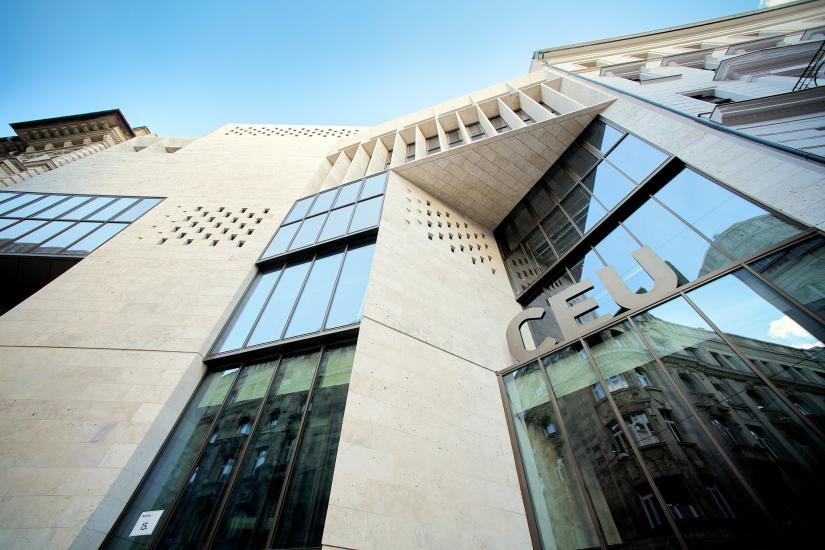
The CEU Center for European Neighborhood Studies (CENS) and the Friedrich Ebert Stiftung cordially invite you to the conference
Visegrad at 25: The future of the Central European regional cooperation
May 12 (Thursday), 2016
9.15 - 18.00
Central European University, October Hall
(1051 Budapest, Október 6 str. 7.)
The Visegrad Cooperation, launched in 1991, is celebrating its 25th anniversary this year. While over the past decades many have buried the cooperation time and again, the Visegrad 4 remained a lasting framework of Central European regional cooperation. The incumbent Czech Presidency of the Group sought to strengthen its internal cohesion under the slogan “V4 Trust”, and indeed now, in 2016, the cooperation is often argued to be stronger than ever. This notion of unity, however, is primarily fed by the Group’s response to the migration and refugee crisis, which is only one of the many challenges the European Union, the organization the V4 sought to join at the time of its foundation, is facing currently. This important anniversary finds the Visegrad Cooperation at a highly volatile time. This, apart from reflecting on the achievements of the past 25 years, also prompts us to contemplate the Visegrad Cooperation’s role in its rapidly changing wider geopolitical environment. The deliberation is especially timely as one of the Group’s members, Slovakia, is just approaching its first Presidency of the Council of the European Union in the second half of 2016. Therefore, by bringing together analysts of the region’s think tanks, the conference seeks to comprehensively assess the current state of the regional cooperation, to discuss the trajectories of its future development as a group as well as its place in Europe broadly understood.
In three panels, the speakers of the conference will discuss the future priorities of the regional cooperation focusing on what sectoral areas could foster the development of the region; the future directions of the Visegrad Group's foreign and security policy priorities; and finally the role the V4 can play in the European Union in the future.
Register at Zsuzsanna Végh (veghzs@ceu.edu) by May 10.
Program of the event
9.15 – 9.45 Registration
9.45 – 10.00 Opening remarks
Jan Niklas Engels, Director, Friedrich-Ebert-Stiftung, Budapest
Péter Balázs, Director, CEU Center for European Neighborhood Studies, Budapest
10.00 – 10.20 Keynote speech
Beata Jaczewska, Executive Director, International Visegrad Fund, Bratislava
10.20 – 12.20 Panel I. – Visegrad Within: Future priorities for the regional cooperation
Although cooperation in the Visegrad Group remained non-institutionalized over the past decades, sectoral cooperation has steadily developed and coordination on multiple levels have become the reality of intra-group relation in a multitude of areas. Energy as well as defense policy stand out as issue areas with concrete developments over the past years, although without doubt much remains to be done. Other areas of mutual concern, e.g. infrastructural development, still lag behind substantially, while again others, such as innovations, are becoming more and more popular on the Central European agenda. The panel will take stock of the major recent achievements of Visegrad sectoral cooperation and will discuss what lies ahead for the Visegrad Group in terms of furthering its internal agenda.
Chair: Zsuzsanna Végh, Research Fellow, CEU Center for European Neighborhood Studies, Budapest
Speakers:
Michal Kořan, Deputy Director, Institute for International Relations, Prague
Andrzej Sadecki, Research Fellow, Center for Eastern Studies, Warsaw
Tomáš Strážay, Research Fellow, Slovak Foreign Policy Association, Bratislava
Gábor Túry, Research Fellow, Institute of World Economics, Centre for Economic and Regional Studies of the Hungarian Academy of Sciences, Budapest
12.20 – 13.30 Buffet lunch
13.30 – 15.30 Panel II. – Visegrad+: Where should Visegrad’s external priorities lie?
Following the Visegrad countries EU accession, the Group’s external agenda found its primary focus in the EU’s Eastern neighborhood and the Western Balkans, mainly in supporting their democratization and Europeanization. The recent years have brought apparent divisions within Visegrad in the foreign policy domain over the evaluation of Russia’s role in Ukraine, nevertheless the Group remained united in its stance on supporting –to various degrees– Ukraine on its European path. Meanwhile in the Western Balkans, thanks to the support of the V4 and modeled on the International Visegrad Fund, the Western Balkan Fund was set up to strengthen regional cooperation and stability. The panel will evaluate the performance of the Visegrad countries’ external engagement and will assess what changes and improvements should be made to strengthen the Visegrad Group’s external profile.
Chair: Hana Semanić, Research Fellow, CEU Center for European Neighborhood Studies, Budapest
Speakers:
Vít Dostál, Director of the Research Center, Association for International Affairs, Prague
Róbert Ondrejcsák, Director, Center for European and North Atlantic Affairs, Bratislava
Anita Sobják, Research Fellow, Polish Institute of International Affairs, Warsaw
Zsuzsanna Végh, Research Fellow, CEU Center for European Neighborhood Studies, Budapest
15.30 – 15.45 Coffee break
15.45 – 17.45 Panel III. – Visegrad in the EU: How to contribute beyond protest?
A variety of issues have filled the EU’s agenda over the past year, but the one through which the Visegrad Group’s visibility has significantly increased on the European stage was clearly the migration and refugee crisis. Yet, it is in the V4’s interest not to be viewed as the epitome of a protest group within the European community and to foster a constructive image and activities on issues which matter for the region as a whole. The panel will assess what policy priorities stand out for the V4 on which they could and should step up on the European stage constructively in the coming years. It will also discuss the potential role of the upcoming Slovak Presidency of the Council of the European Union in shaping both the image and the concrete contribution of the V4 within the EU.
Chair: Miklós Haraszti, Director of Research on Human Rights, CEU Center for European Neighborhood Studies, Budapest
Speakers:
Péter Balázs, Director, CEU Center for European Neighborhood Studies, Budapest
Pavol Demeš, Non-resident Fellow, German Marshall Fund, Bratislava
Wojciech Przybylski, Editor-in-chief, Eurozine, Visegrad Insight, Warsaw
Michal Vít, Research Fellow, EUROPEUM, Prague
17.45 – 18.00 Concluding remarks